2806NRS Research in Nursing: William Case Study Annotated Bibliography
VerifiedAdded on 2023/01/11
|8
|2552
|27
Report
AI Summary
This report presents an annotated bibliography based on a case study of William, a 75-year-old man diagnosed with chronic heart failure. The assignment, completed for a nursing research course, analyzes three research articles focusing on evidence-based guidance for managing William's condition. The first article explores dietary approaches for patients with heart failure and diabetes, emphasizing the importance of fluid and sodium restriction and the potential benefits of the Mediterranean diet. The second article reviews the effectiveness of psychological interventions on self-care, psychological, and health outcomes, highlighting the role of nurses in promoting self-care management. The third article examines interventions to enhance medication adherence, identifying key strategies such as patient education and simplified drug regimes. The report includes a justification for the article selections, supported by scholarly literature, and concludes with recommendations for patient/clinical practice, including dietary management, enhancing self-care, and ensuring medication adherence.

Critical Review
University
Unit
Name
Tutor
Date
University
Unit
Name
Tutor
Date
Paraphrase This Document
Need a fresh take? Get an instant paraphrase of this document with our AI Paraphraser
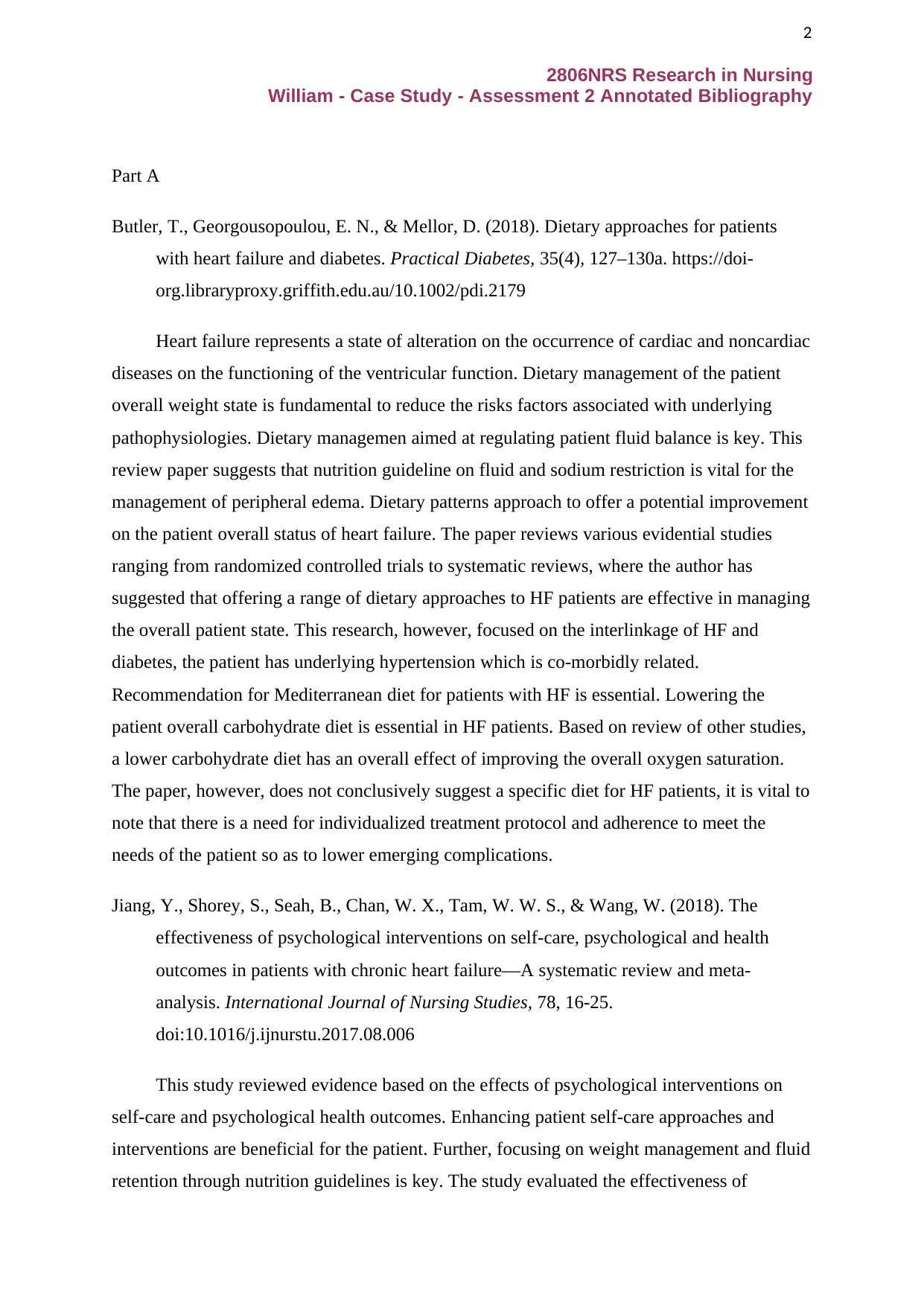
2
2806NRS Research in Nursing
William - Case Study - Assessment 2 Annotated Bibliography
Part A
Butler, T., Georgousopoulou, E. N., & Mellor, D. (2018). Dietary approaches for patients
with heart failure and diabetes. Practical Diabetes, 35(4), 127–130a. https://doi-
org.libraryproxy.griffith.edu.au/10.1002/pdi.2179
Heart failure represents a state of alteration on the occurrence of cardiac and noncardiac
diseases on the functioning of the ventricular function. Dietary management of the patient
overall weight state is fundamental to reduce the risks factors associated with underlying
pathophysiologies. Dietary managemen aimed at regulating patient fluid balance is key. This
review paper suggests that nutrition guideline on fluid and sodium restriction is vital for the
management of peripheral edema. Dietary patterns approach to offer a potential improvement
on the patient overall status of heart failure. The paper reviews various evidential studies
ranging from randomized controlled trials to systematic reviews, where the author has
suggested that offering a range of dietary approaches to HF patients are effective in managing
the overall patient state. This research, however, focused on the interlinkage of HF and
diabetes, the patient has underlying hypertension which is co-morbidly related.
Recommendation for Mediterranean diet for patients with HF is essential. Lowering the
patient overall carbohydrate diet is essential in HF patients. Based on review of other studies,
a lower carbohydrate diet has an overall effect of improving the overall oxygen saturation.
The paper, however, does not conclusively suggest a specific diet for HF patients, it is vital to
note that there is a need for individualized treatment protocol and adherence to meet the
needs of the patient so as to lower emerging complications.
Jiang, Y., Shorey, S., Seah, B., Chan, W. X., Tam, W. W. S., & Wang, W. (2018). The
effectiveness of psychological interventions on self-care, psychological and health
outcomes in patients with chronic heart failure—A systematic review and meta-
analysis. International Journal of Nursing Studies, 78, 16-25.
doi:10.1016/j.ijnurstu.2017.08.006
This study reviewed evidence based on the effects of psychological interventions on
self-care and psychological health outcomes. Enhancing patient self-care approaches and
interventions are beneficial for the patient. Further, focusing on weight management and fluid
retention through nutrition guidelines is key. The study evaluated the effectiveness of
2806NRS Research in Nursing
William - Case Study - Assessment 2 Annotated Bibliography
Part A
Butler, T., Georgousopoulou, E. N., & Mellor, D. (2018). Dietary approaches for patients
with heart failure and diabetes. Practical Diabetes, 35(4), 127–130a. https://doi-
org.libraryproxy.griffith.edu.au/10.1002/pdi.2179
Heart failure represents a state of alteration on the occurrence of cardiac and noncardiac
diseases on the functioning of the ventricular function. Dietary management of the patient
overall weight state is fundamental to reduce the risks factors associated with underlying
pathophysiologies. Dietary managemen aimed at regulating patient fluid balance is key. This
review paper suggests that nutrition guideline on fluid and sodium restriction is vital for the
management of peripheral edema. Dietary patterns approach to offer a potential improvement
on the patient overall status of heart failure. The paper reviews various evidential studies
ranging from randomized controlled trials to systematic reviews, where the author has
suggested that offering a range of dietary approaches to HF patients are effective in managing
the overall patient state. This research, however, focused on the interlinkage of HF and
diabetes, the patient has underlying hypertension which is co-morbidly related.
Recommendation for Mediterranean diet for patients with HF is essential. Lowering the
patient overall carbohydrate diet is essential in HF patients. Based on review of other studies,
a lower carbohydrate diet has an overall effect of improving the overall oxygen saturation.
The paper, however, does not conclusively suggest a specific diet for HF patients, it is vital to
note that there is a need for individualized treatment protocol and adherence to meet the
needs of the patient so as to lower emerging complications.
Jiang, Y., Shorey, S., Seah, B., Chan, W. X., Tam, W. W. S., & Wang, W. (2018). The
effectiveness of psychological interventions on self-care, psychological and health
outcomes in patients with chronic heart failure—A systematic review and meta-
analysis. International Journal of Nursing Studies, 78, 16-25.
doi:10.1016/j.ijnurstu.2017.08.006
This study reviewed evidence based on the effects of psychological interventions on
self-care and psychological health outcomes. Enhancing patient self-care approaches and
interventions are beneficial for the patient. Further, focusing on weight management and fluid
retention through nutrition guidelines is key. The study evaluated the effectiveness of

3
randomized controlled trials based on psychological methods on self-care, anxiety,
depression and physical function ability of patients. The study searched studies between 2006
and 2016 in various databases. A total of 29 articles, entailing 25 studies with 3837 subjects
were induced in the systematic review. The results of the study showed that despite the
heterogeneity of the results obtained, psychological interventions tend to improve overall
self-care of heart failure. Efforts geared towards promoting the patient self-care process are
the key cornerstone in managing HF disease and its consequential complications. The key
limitation observed by the study entailed the inclusion of moderate to high-level
heterogeneity of the included studies which could significantly affect the reliability of the
produced results.
The role of a nurses play a vital role in ensuring a more holistic aspect of the disease is
offered to the patient. Assessment of cognitive behavior therapy on self-care is essential for
the patient. The patient overall health status is declining due to limited behavioral cognitive
therapy which can be vital on self-care aspects of the patient. Engaging in self-care prospects
with regard to weight management and exercise control will be essential for the patient.
Molloy, G. J., O'Carroll, R. E., Witham, M. D., & McMurdo, M. E. T. (2012). Interventions
to enhance adherence to medications in patients with heart failure: A systematic review.
Circulation Heart Failure, 5, 126-133.
http://dx.doi.org/10.1161/CIRCHEARTFAILURE.111.964569
This study identifies prognosis of heart failure over the recent years marked with
limited understanding despite the development and improvements in its prevention
management. The estimates of median survival after episode attack are 2.3 years for men and
1.8 years for women. The paper focused on none adherence to medication on the
management of heart failure. The study undertook a systematic review of various studies with
a key focus on randomized controlled trials, assessing patients above 18 years and focusing
on medication intervention strategy. Further, it focused on self-administered medications
among patient’s measures as outcomes. The systematic review was undertaken on various
databases and searched for full papers. The review scanned and obtained 15 studies meeting
the inclusion criteria and found out 4 key themes which were crucial for medication
adherence patient education, intensified patient care, complex behavior approaches and
simplification of drug regime on patients. These are key interventions which could improve
the patient state and management of heart failure complications through reduction of
exacerbating risk factors. Despite medication adherence by the patient could have a
randomized controlled trials based on psychological methods on self-care, anxiety,
depression and physical function ability of patients. The study searched studies between 2006
and 2016 in various databases. A total of 29 articles, entailing 25 studies with 3837 subjects
were induced in the systematic review. The results of the study showed that despite the
heterogeneity of the results obtained, psychological interventions tend to improve overall
self-care of heart failure. Efforts geared towards promoting the patient self-care process are
the key cornerstone in managing HF disease and its consequential complications. The key
limitation observed by the study entailed the inclusion of moderate to high-level
heterogeneity of the included studies which could significantly affect the reliability of the
produced results.
The role of a nurses play a vital role in ensuring a more holistic aspect of the disease is
offered to the patient. Assessment of cognitive behavior therapy on self-care is essential for
the patient. The patient overall health status is declining due to limited behavioral cognitive
therapy which can be vital on self-care aspects of the patient. Engaging in self-care prospects
with regard to weight management and exercise control will be essential for the patient.
Molloy, G. J., O'Carroll, R. E., Witham, M. D., & McMurdo, M. E. T. (2012). Interventions
to enhance adherence to medications in patients with heart failure: A systematic review.
Circulation Heart Failure, 5, 126-133.
http://dx.doi.org/10.1161/CIRCHEARTFAILURE.111.964569
This study identifies prognosis of heart failure over the recent years marked with
limited understanding despite the development and improvements in its prevention
management. The estimates of median survival after episode attack are 2.3 years for men and
1.8 years for women. The paper focused on none adherence to medication on the
management of heart failure. The study undertook a systematic review of various studies with
a key focus on randomized controlled trials, assessing patients above 18 years and focusing
on medication intervention strategy. Further, it focused on self-administered medications
among patient’s measures as outcomes. The systematic review was undertaken on various
databases and searched for full papers. The review scanned and obtained 15 studies meeting
the inclusion criteria and found out 4 key themes which were crucial for medication
adherence patient education, intensified patient care, complex behavior approaches and
simplification of drug regime on patients. These are key interventions which could improve
the patient state and management of heart failure complications through reduction of
exacerbating risk factors. Despite medication adherence by the patient could have a
⊘ This is a preview!⊘
Do you want full access?
Subscribe today to unlock all pages.

Trusted by 1+ million students worldwide
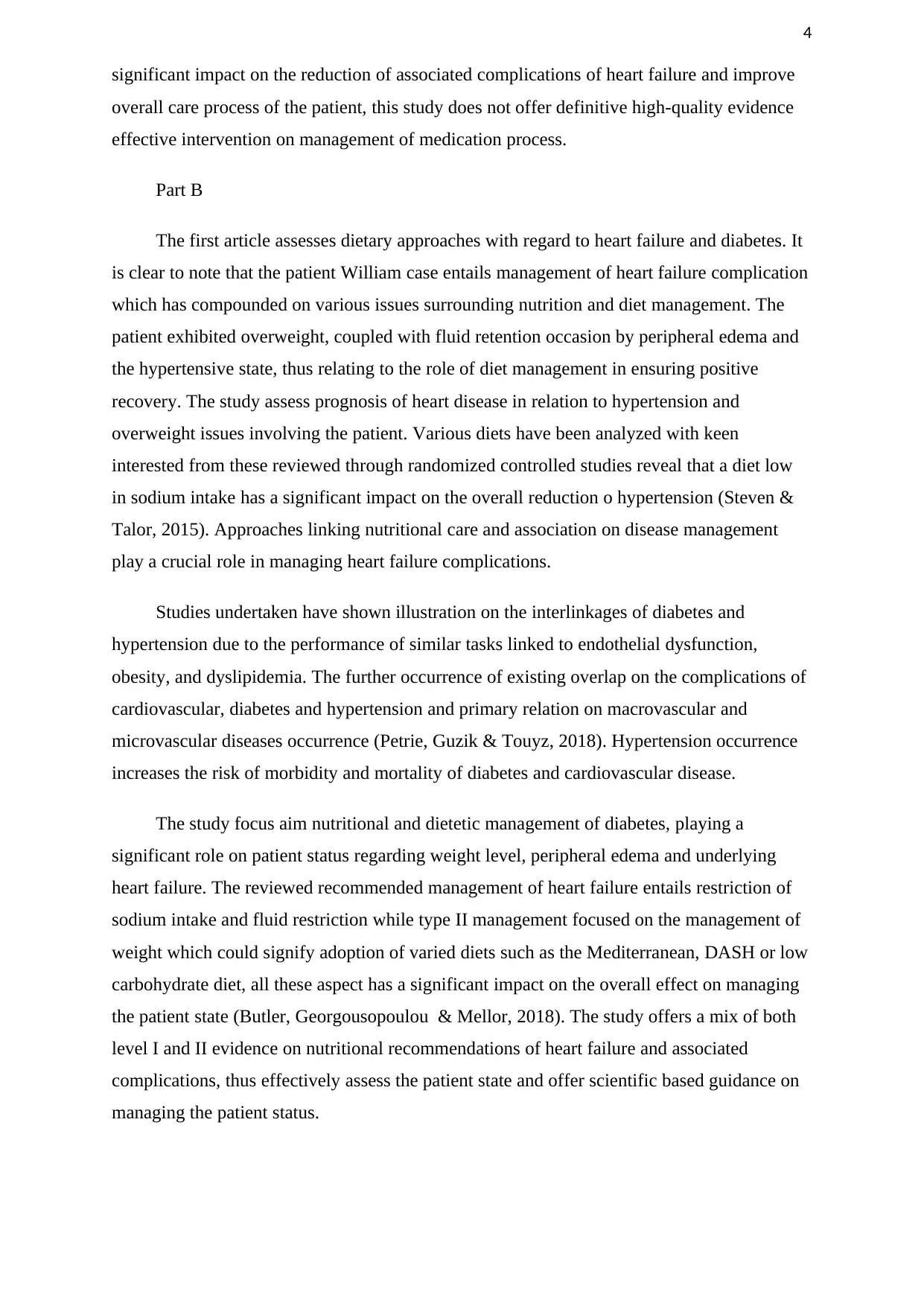
4
significant impact on the reduction of associated complications of heart failure and improve
overall care process of the patient, this study does not offer definitive high-quality evidence
effective intervention on management of medication process.
Part B
The first article assesses dietary approaches with regard to heart failure and diabetes. It
is clear to note that the patient William case entails management of heart failure complication
which has compounded on various issues surrounding nutrition and diet management. The
patient exhibited overweight, coupled with fluid retention occasion by peripheral edema and
the hypertensive state, thus relating to the role of diet management in ensuring positive
recovery. The study assess prognosis of heart disease in relation to hypertension and
overweight issues involving the patient. Various diets have been analyzed with keen
interested from these reviewed through randomized controlled studies reveal that a diet low
in sodium intake has a significant impact on the overall reduction o hypertension (Steven &
Talor, 2015). Approaches linking nutritional care and association on disease management
play a crucial role in managing heart failure complications.
Studies undertaken have shown illustration on the interlinkages of diabetes and
hypertension due to the performance of similar tasks linked to endothelial dysfunction,
obesity, and dyslipidemia. The further occurrence of existing overlap on the complications of
cardiovascular, diabetes and hypertension and primary relation on macrovascular and
microvascular diseases occurrence (Petrie, Guzik & Touyz, 2018). Hypertension occurrence
increases the risk of morbidity and mortality of diabetes and cardiovascular disease.
The study focus aim nutritional and dietetic management of diabetes, playing a
significant role on patient status regarding weight level, peripheral edema and underlying
heart failure. The reviewed recommended management of heart failure entails restriction of
sodium intake and fluid restriction while type II management focused on the management of
weight which could signify adoption of varied diets such as the Mediterranean, DASH or low
carbohydrate diet, all these aspect has a significant impact on the overall effect on managing
the patient state (Butler, Georgousopoulou & Mellor, 2018). The study offers a mix of both
level I and II evidence on nutritional recommendations of heart failure and associated
complications, thus effectively assess the patient state and offer scientific based guidance on
managing the patient status.
significant impact on the reduction of associated complications of heart failure and improve
overall care process of the patient, this study does not offer definitive high-quality evidence
effective intervention on management of medication process.
Part B
The first article assesses dietary approaches with regard to heart failure and diabetes. It
is clear to note that the patient William case entails management of heart failure complication
which has compounded on various issues surrounding nutrition and diet management. The
patient exhibited overweight, coupled with fluid retention occasion by peripheral edema and
the hypertensive state, thus relating to the role of diet management in ensuring positive
recovery. The study assess prognosis of heart disease in relation to hypertension and
overweight issues involving the patient. Various diets have been analyzed with keen
interested from these reviewed through randomized controlled studies reveal that a diet low
in sodium intake has a significant impact on the overall reduction o hypertension (Steven &
Talor, 2015). Approaches linking nutritional care and association on disease management
play a crucial role in managing heart failure complications.
Studies undertaken have shown illustration on the interlinkages of diabetes and
hypertension due to the performance of similar tasks linked to endothelial dysfunction,
obesity, and dyslipidemia. The further occurrence of existing overlap on the complications of
cardiovascular, diabetes and hypertension and primary relation on macrovascular and
microvascular diseases occurrence (Petrie, Guzik & Touyz, 2018). Hypertension occurrence
increases the risk of morbidity and mortality of diabetes and cardiovascular disease.
The study focus aim nutritional and dietetic management of diabetes, playing a
significant role on patient status regarding weight level, peripheral edema and underlying
heart failure. The reviewed recommended management of heart failure entails restriction of
sodium intake and fluid restriction while type II management focused on the management of
weight which could signify adoption of varied diets such as the Mediterranean, DASH or low
carbohydrate diet, all these aspect has a significant impact on the overall effect on managing
the patient state (Butler, Georgousopoulou & Mellor, 2018). The study offers a mix of both
level I and II evidence on nutritional recommendations of heart failure and associated
complications, thus effectively assess the patient state and offer scientific based guidance on
managing the patient status.
Paraphrase This Document
Need a fresh take? Get an instant paraphrase of this document with our AI Paraphraser
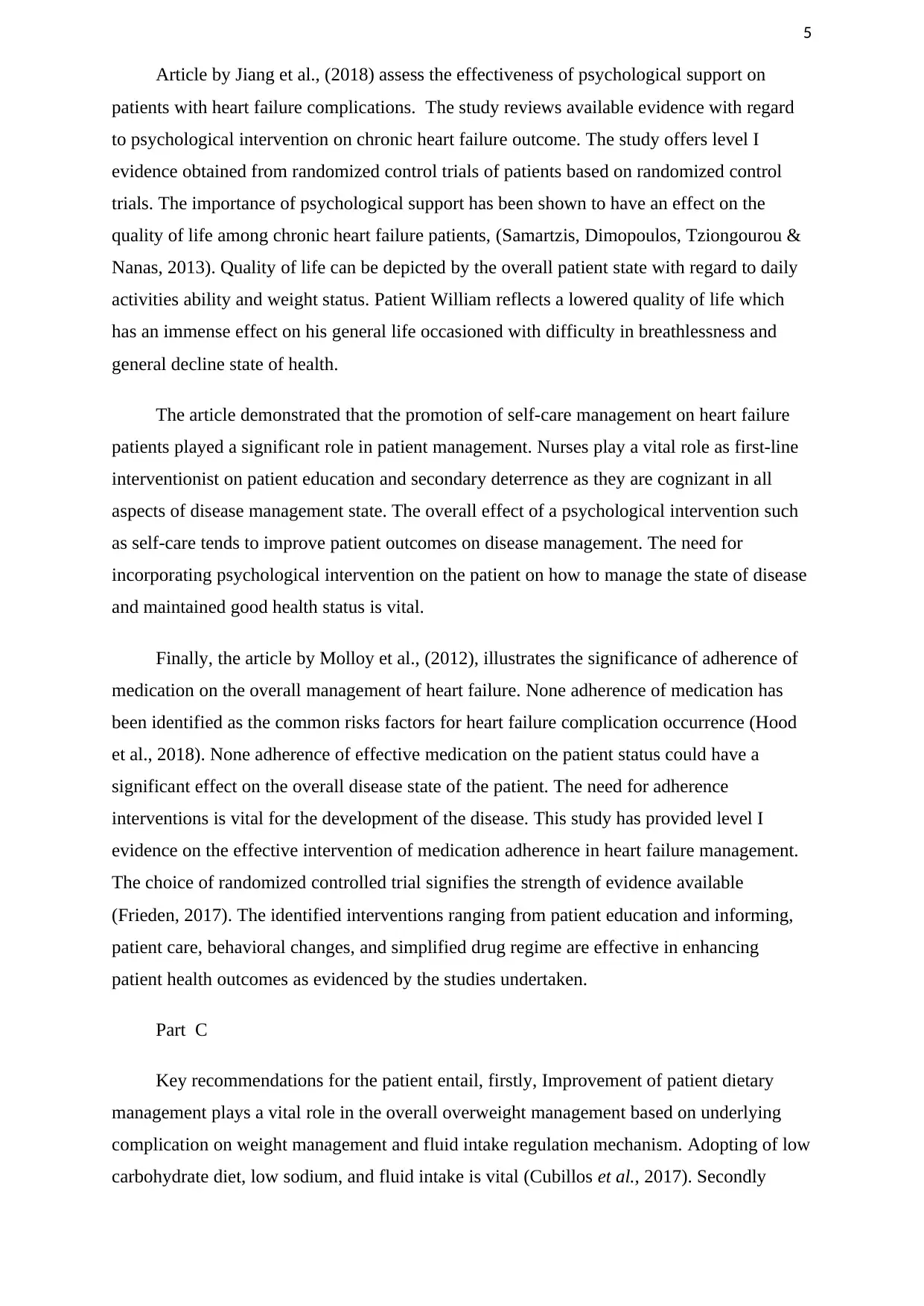
5
Article by Jiang et al., (2018) assess the effectiveness of psychological support on
patients with heart failure complications. The study reviews available evidence with regard
to psychological intervention on chronic heart failure outcome. The study offers level I
evidence obtained from randomized control trials of patients based on randomized control
trials. The importance of psychological support has been shown to have an effect on the
quality of life among chronic heart failure patients, (Samartzis, Dimopoulos, Tziongourou &
Nanas, 2013). Quality of life can be depicted by the overall patient state with regard to daily
activities ability and weight status. Patient William reflects a lowered quality of life which
has an immense effect on his general life occasioned with difficulty in breathlessness and
general decline state of health.
The article demonstrated that the promotion of self-care management on heart failure
patients played a significant role in patient management. Nurses play a vital role as first-line
interventionist on patient education and secondary deterrence as they are cognizant in all
aspects of disease management state. The overall effect of a psychological intervention such
as self-care tends to improve patient outcomes on disease management. The need for
incorporating psychological intervention on the patient on how to manage the state of disease
and maintained good health status is vital.
Finally, the article by Molloy et al., (2012), illustrates the significance of adherence of
medication on the overall management of heart failure. None adherence of medication has
been identified as the common risks factors for heart failure complication occurrence (Hood
et al., 2018). None adherence of effective medication on the patient status could have a
significant effect on the overall disease state of the patient. The need for adherence
interventions is vital for the development of the disease. This study has provided level I
evidence on the effective intervention of medication adherence in heart failure management.
The choice of randomized controlled trial signifies the strength of evidence available
(Frieden, 2017). The identified interventions ranging from patient education and informing,
patient care, behavioral changes, and simplified drug regime are effective in enhancing
patient health outcomes as evidenced by the studies undertaken.
Part C
Key recommendations for the patient entail, firstly, Improvement of patient dietary
management plays a vital role in the overall overweight management based on underlying
complication on weight management and fluid intake regulation mechanism. Adopting of low
carbohydrate diet, low sodium, and fluid intake is vital (Cubillos et al., 2017). Secondly
Article by Jiang et al., (2018) assess the effectiveness of psychological support on
patients with heart failure complications. The study reviews available evidence with regard
to psychological intervention on chronic heart failure outcome. The study offers level I
evidence obtained from randomized control trials of patients based on randomized control
trials. The importance of psychological support has been shown to have an effect on the
quality of life among chronic heart failure patients, (Samartzis, Dimopoulos, Tziongourou &
Nanas, 2013). Quality of life can be depicted by the overall patient state with regard to daily
activities ability and weight status. Patient William reflects a lowered quality of life which
has an immense effect on his general life occasioned with difficulty in breathlessness and
general decline state of health.
The article demonstrated that the promotion of self-care management on heart failure
patients played a significant role in patient management. Nurses play a vital role as first-line
interventionist on patient education and secondary deterrence as they are cognizant in all
aspects of disease management state. The overall effect of a psychological intervention such
as self-care tends to improve patient outcomes on disease management. The need for
incorporating psychological intervention on the patient on how to manage the state of disease
and maintained good health status is vital.
Finally, the article by Molloy et al., (2012), illustrates the significance of adherence of
medication on the overall management of heart failure. None adherence of medication has
been identified as the common risks factors for heart failure complication occurrence (Hood
et al., 2018). None adherence of effective medication on the patient status could have a
significant effect on the overall disease state of the patient. The need for adherence
interventions is vital for the development of the disease. This study has provided level I
evidence on the effective intervention of medication adherence in heart failure management.
The choice of randomized controlled trial signifies the strength of evidence available
(Frieden, 2017). The identified interventions ranging from patient education and informing,
patient care, behavioral changes, and simplified drug regime are effective in enhancing
patient health outcomes as evidenced by the studies undertaken.
Part C
Key recommendations for the patient entail, firstly, Improvement of patient dietary
management plays a vital role in the overall overweight management based on underlying
complication on weight management and fluid intake regulation mechanism. Adopting of low
carbohydrate diet, low sodium, and fluid intake is vital (Cubillos et al., 2017). Secondly
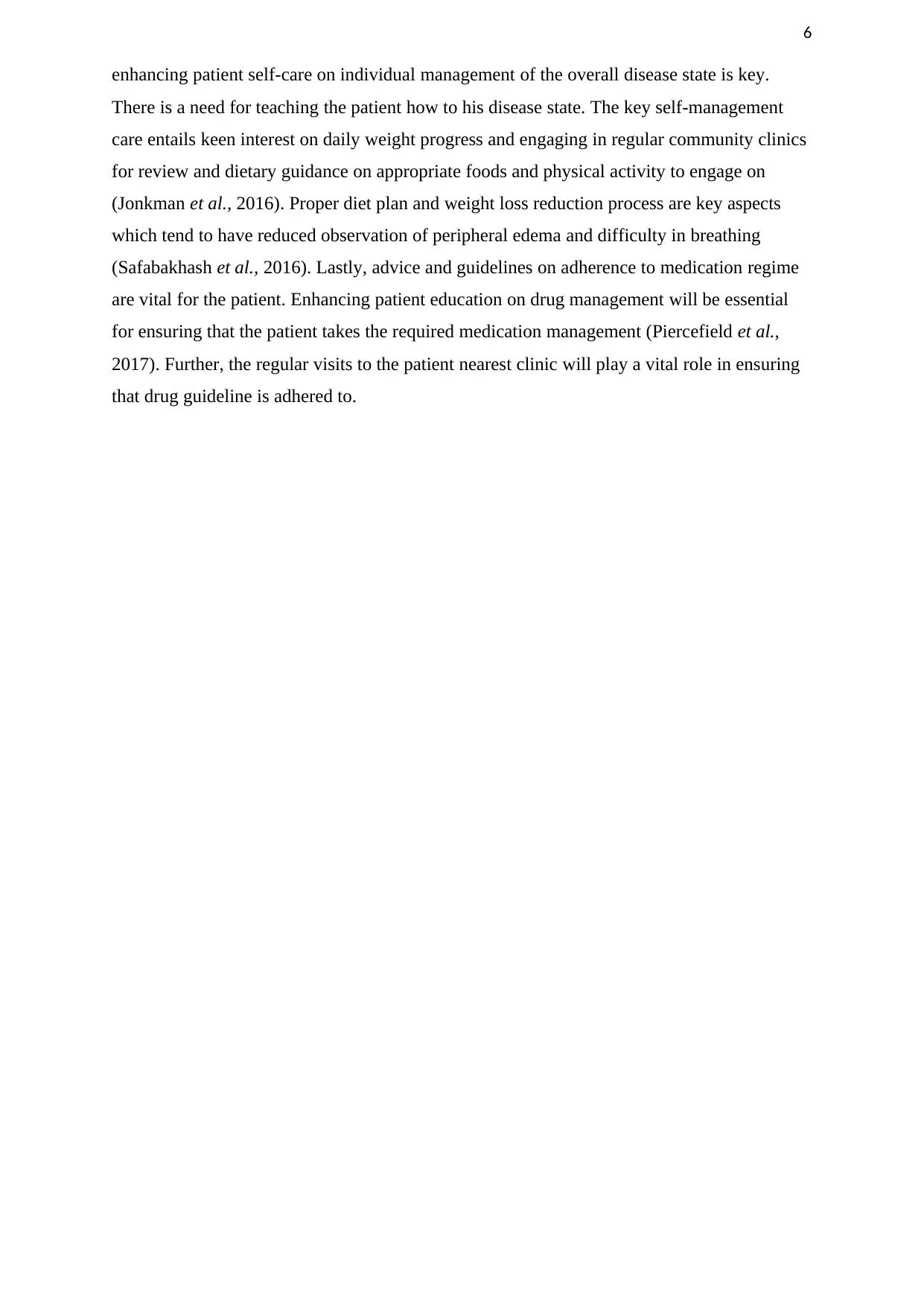
6
enhancing patient self-care on individual management of the overall disease state is key.
There is a need for teaching the patient how to his disease state. The key self-management
care entails keen interest on daily weight progress and engaging in regular community clinics
for review and dietary guidance on appropriate foods and physical activity to engage on
(Jonkman et al., 2016). Proper diet plan and weight loss reduction process are key aspects
which tend to have reduced observation of peripheral edema and difficulty in breathing
(Safabakhash et al., 2016). Lastly, advice and guidelines on adherence to medication regime
are vital for the patient. Enhancing patient education on drug management will be essential
for ensuring that the patient takes the required medication management (Piercefield et al.,
2017). Further, the regular visits to the patient nearest clinic will play a vital role in ensuring
that drug guideline is adhered to.
enhancing patient self-care on individual management of the overall disease state is key.
There is a need for teaching the patient how to his disease state. The key self-management
care entails keen interest on daily weight progress and engaging in regular community clinics
for review and dietary guidance on appropriate foods and physical activity to engage on
(Jonkman et al., 2016). Proper diet plan and weight loss reduction process are key aspects
which tend to have reduced observation of peripheral edema and difficulty in breathing
(Safabakhash et al., 2016). Lastly, advice and guidelines on adherence to medication regime
are vital for the patient. Enhancing patient education on drug management will be essential
for ensuring that the patient takes the required medication management (Piercefield et al.,
2017). Further, the regular visits to the patient nearest clinic will play a vital role in ensuring
that drug guideline is adhered to.
⊘ This is a preview!⊘
Do you want full access?
Subscribe today to unlock all pages.

Trusted by 1+ million students worldwide
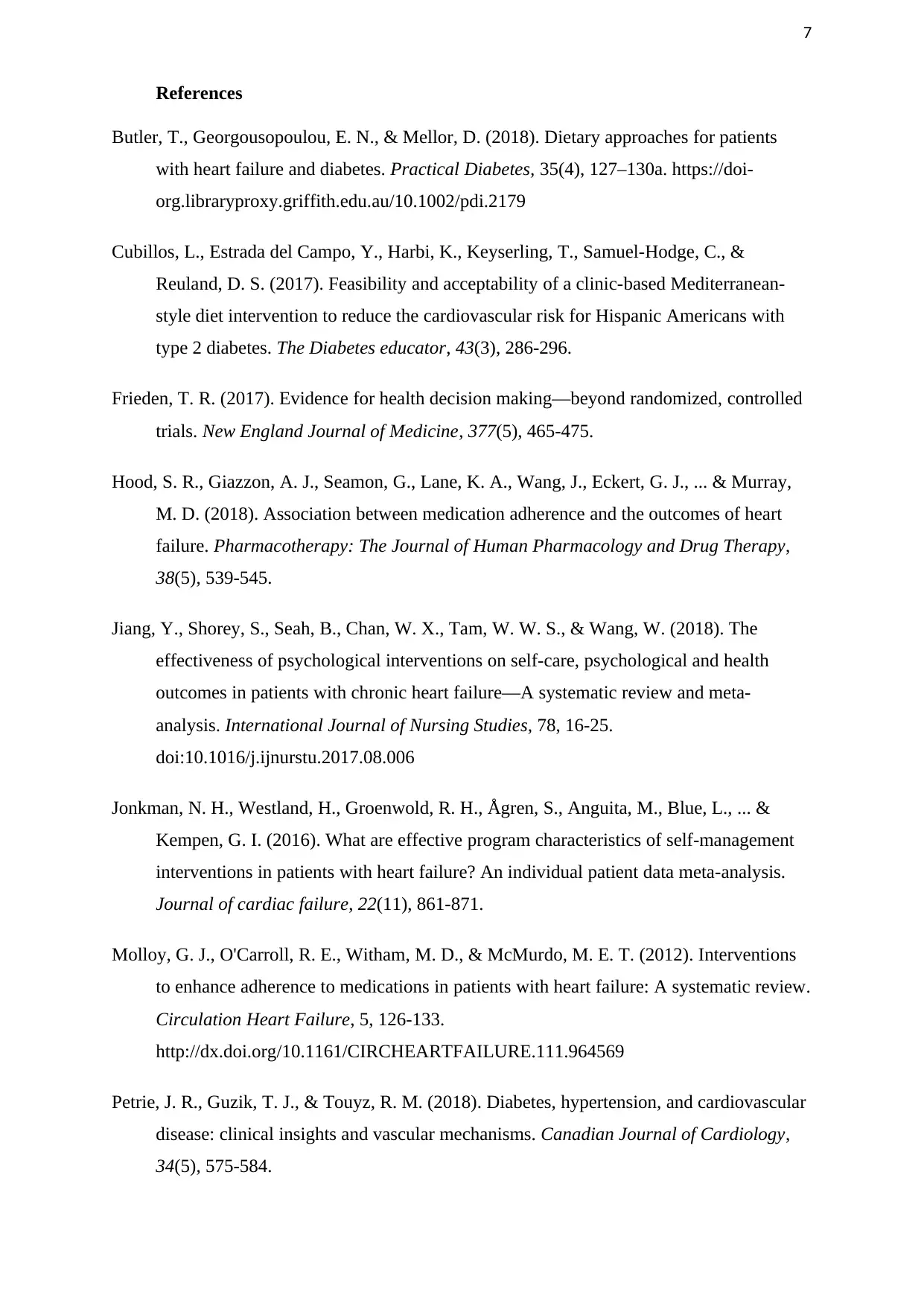
7
References
Butler, T., Georgousopoulou, E. N., & Mellor, D. (2018). Dietary approaches for patients
with heart failure and diabetes. Practical Diabetes, 35(4), 127–130a. https://doi-
org.libraryproxy.griffith.edu.au/10.1002/pdi.2179
Cubillos, L., Estrada del Campo, Y., Harbi, K., Keyserling, T., Samuel-Hodge, C., &
Reuland, D. S. (2017). Feasibility and acceptability of a clinic-based Mediterranean-
style diet intervention to reduce the cardiovascular risk for Hispanic Americans with
type 2 diabetes. The Diabetes educator, 43(3), 286-296.
Frieden, T. R. (2017). Evidence for health decision making—beyond randomized, controlled
trials. New England Journal of Medicine, 377(5), 465-475.
Hood, S. R., Giazzon, A. J., Seamon, G., Lane, K. A., Wang, J., Eckert, G. J., ... & Murray,
M. D. (2018). Association between medication adherence and the outcomes of heart
failure. Pharmacotherapy: The Journal of Human Pharmacology and Drug Therapy,
38(5), 539-545.
Jiang, Y., Shorey, S., Seah, B., Chan, W. X., Tam, W. W. S., & Wang, W. (2018). The
effectiveness of psychological interventions on self-care, psychological and health
outcomes in patients with chronic heart failure—A systematic review and meta-
analysis. International Journal of Nursing Studies, 78, 16-25.
doi:10.1016/j.ijnurstu.2017.08.006
Jonkman, N. H., Westland, H., Groenwold, R. H., Ågren, S., Anguita, M., Blue, L., ... &
Kempen, G. I. (2016). What are effective program characteristics of self-management
interventions in patients with heart failure? An individual patient data meta-analysis.
Journal of cardiac failure, 22(11), 861-871.
Molloy, G. J., O'Carroll, R. E., Witham, M. D., & McMurdo, M. E. T. (2012). Interventions
to enhance adherence to medications in patients with heart failure: A systematic review.
Circulation Heart Failure, 5, 126-133.
http://dx.doi.org/10.1161/CIRCHEARTFAILURE.111.964569
Petrie, J. R., Guzik, T. J., & Touyz, R. M. (2018). Diabetes, hypertension, and cardiovascular
disease: clinical insights and vascular mechanisms. Canadian Journal of Cardiology,
34(5), 575-584.
References
Butler, T., Georgousopoulou, E. N., & Mellor, D. (2018). Dietary approaches for patients
with heart failure and diabetes. Practical Diabetes, 35(4), 127–130a. https://doi-
org.libraryproxy.griffith.edu.au/10.1002/pdi.2179
Cubillos, L., Estrada del Campo, Y., Harbi, K., Keyserling, T., Samuel-Hodge, C., &
Reuland, D. S. (2017). Feasibility and acceptability of a clinic-based Mediterranean-
style diet intervention to reduce the cardiovascular risk for Hispanic Americans with
type 2 diabetes. The Diabetes educator, 43(3), 286-296.
Frieden, T. R. (2017). Evidence for health decision making—beyond randomized, controlled
trials. New England Journal of Medicine, 377(5), 465-475.
Hood, S. R., Giazzon, A. J., Seamon, G., Lane, K. A., Wang, J., Eckert, G. J., ... & Murray,
M. D. (2018). Association between medication adherence and the outcomes of heart
failure. Pharmacotherapy: The Journal of Human Pharmacology and Drug Therapy,
38(5), 539-545.
Jiang, Y., Shorey, S., Seah, B., Chan, W. X., Tam, W. W. S., & Wang, W. (2018). The
effectiveness of psychological interventions on self-care, psychological and health
outcomes in patients with chronic heart failure—A systematic review and meta-
analysis. International Journal of Nursing Studies, 78, 16-25.
doi:10.1016/j.ijnurstu.2017.08.006
Jonkman, N. H., Westland, H., Groenwold, R. H., Ågren, S., Anguita, M., Blue, L., ... &
Kempen, G. I. (2016). What are effective program characteristics of self-management
interventions in patients with heart failure? An individual patient data meta-analysis.
Journal of cardiac failure, 22(11), 861-871.
Molloy, G. J., O'Carroll, R. E., Witham, M. D., & McMurdo, M. E. T. (2012). Interventions
to enhance adherence to medications in patients with heart failure: A systematic review.
Circulation Heart Failure, 5, 126-133.
http://dx.doi.org/10.1161/CIRCHEARTFAILURE.111.964569
Petrie, J. R., Guzik, T. J., & Touyz, R. M. (2018). Diabetes, hypertension, and cardiovascular
disease: clinical insights and vascular mechanisms. Canadian Journal of Cardiology,
34(5), 575-584.
Paraphrase This Document
Need a fresh take? Get an instant paraphrase of this document with our AI Paraphraser
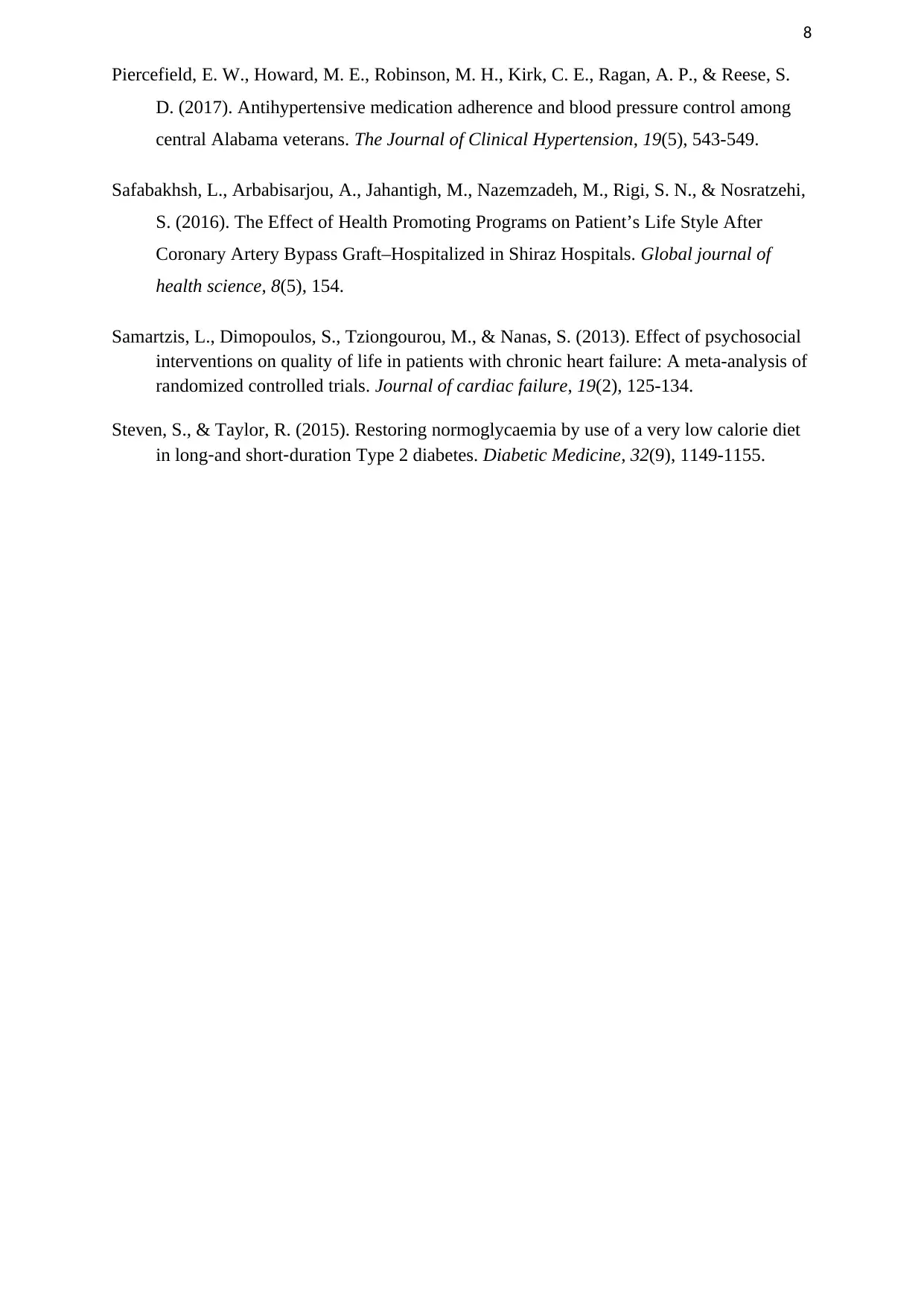
8
Piercefield, E. W., Howard, M. E., Robinson, M. H., Kirk, C. E., Ragan, A. P., & Reese, S.
D. (2017). Antihypertensive medication adherence and blood pressure control among
central Alabama veterans. The Journal of Clinical Hypertension, 19(5), 543-549.
Safabakhsh, L., Arbabisarjou, A., Jahantigh, M., Nazemzadeh, M., Rigi, S. N., & Nosratzehi,
S. (2016). The Effect of Health Promoting Programs on Patient’s Life Style After
Coronary Artery Bypass Graft–Hospitalized in Shiraz Hospitals. Global journal of
health science, 8(5), 154.
Samartzis, L., Dimopoulos, S., Tziongourou, M., & Nanas, S. (2013). Effect of psychosocial
interventions on quality of life in patients with chronic heart failure: A meta-analysis of
randomized controlled trials. Journal of cardiac failure, 19(2), 125-134.
Steven, S., & Taylor, R. (2015). Restoring normoglycaemia by use of a very low calorie diet
in long‐and short‐duration Type 2 diabetes. Diabetic Medicine, 32(9), 1149-1155.
Piercefield, E. W., Howard, M. E., Robinson, M. H., Kirk, C. E., Ragan, A. P., & Reese, S.
D. (2017). Antihypertensive medication adherence and blood pressure control among
central Alabama veterans. The Journal of Clinical Hypertension, 19(5), 543-549.
Safabakhsh, L., Arbabisarjou, A., Jahantigh, M., Nazemzadeh, M., Rigi, S. N., & Nosratzehi,
S. (2016). The Effect of Health Promoting Programs on Patient’s Life Style After
Coronary Artery Bypass Graft–Hospitalized in Shiraz Hospitals. Global journal of
health science, 8(5), 154.
Samartzis, L., Dimopoulos, S., Tziongourou, M., & Nanas, S. (2013). Effect of psychosocial
interventions on quality of life in patients with chronic heart failure: A meta-analysis of
randomized controlled trials. Journal of cardiac failure, 19(2), 125-134.
Steven, S., & Taylor, R. (2015). Restoring normoglycaemia by use of a very low calorie diet
in long‐and short‐duration Type 2 diabetes. Diabetic Medicine, 32(9), 1149-1155.
1 out of 8
Related Documents
Your All-in-One AI-Powered Toolkit for Academic Success.
+13062052269
info@desklib.com
Available 24*7 on WhatsApp / Email
![[object Object]](/_next/static/media/star-bottom.7253800d.svg)
Unlock your academic potential
Copyright © 2020–2026 A2Z Services. All Rights Reserved. Developed and managed by ZUCOL.





